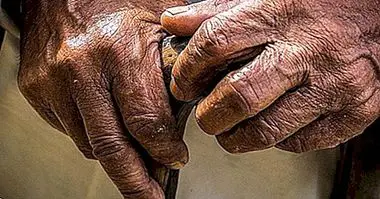Symptoms and signs of personality disorders
We have all heard someone call someone paranoid, antisocial, narcissistic or obsessive-compulsive.
They are ways of speaking, so we do not have to give more importance, but we must be aware that these "adjectives" are personality disorders that cause enormous discomfort to the people affected and their immediate environment.
Therefore I think it is interesting to know a little more about these disorders and perhaps, it helps us to reconsider our vocabulary and how our words can sometimes go further.
Mental disorders in general and personality disorders, in particular, affect a large number of people, so it is interesting to know a little more about them because this will help us and also, as a society.
Recommended article: "The 10 types of personality disorders"
The characteristics of personality disorders
There are different personality disorders, but all of them maintain a general diagnostic criteria .
The behavior of the person will be clearly separated from what their culture considers correct or expectations. This must be reflected in at least two of the following areas:
- Cognition : the way of perceiving and interpreting.
- Affectivity : emotional response
- Interpersonal activity : relationship with other people.
- Pulse control .
This behavior or behavior must be persistent, inflexible and affect a wide range of personal and social situations. It also causes clinically significant discomfort or significant involvement in areas such as social relationships or the workplace.
This type of maladaptive behavior usually begin in adolescence or adulthood and remain stable .
Finally it is important that we know that there are some personality disorders that are due to the ingestion of substances such as drugs or drugs, or that may occur as a result of a medical illness. Therefore, we must know if this pattern of persistent behavior is not due to any of these factors.
Basic classification of personality disorders
Once defined these general criteria, we will see some of the personality disorders so that we can distinguish them. We will divide them into 3 groups according to the similarity of their characteristics.
It should be remembered that The characteristics that we will see below do not have to define the disorder unless the criteria defined above are also met.
Rare or eccentric
This group of disorders is characterized by a clearly abnormal pattern both in relation to cognition and in the expression and the relationship with others.
- Paranoid : they show excessive distrust and suspicion, interpreting the intentions of others as malicious. They suspect that they are going to take advantage of them, that they will hurt them or cheat them. They also present unjustified doubts in relation to loyalty or fidelity and a reluctance to trust others.
- Schizoid: distancing of social relationships and difficulty for emotional expression. They do not enjoy social relationships, they do not have friends or trusted people, they show themselves as cold and distant people.
- Schizotypal : social and interpersonal deficit associated with acute discomfort and little capacity for personal relationships. Cognitive or perceptual distortions and eccentricities in their behavior. They have strange beliefs or a tendency to magical thinking that influences their behavior. They usually have unusual perceptual experiences, rare thoughts, language and appearance; They are suspicious, have emotional difficulties, lack of close friends or social anxiety.
Dramatic, emotional or unstable
The following disorders are characterized by a pattern of violation of social norms, impulsive behaviors, excessive emotion and grandiosity .
- Antisocial : contempt and violation of the rights of others. They do not adapt to social norms regarding legal behavior, they are dishonest people and they usually lie. They present impulsivity, irritability and aggressiveness, as well as a lack of remorse, persistent irresponsibility and inability to take charge of their obligations.
- Limit: they are characterized by instability in interpersonal relationships, self-image and effectiveness. Impulsiveness. they present an alteration of identity, impulsiveness and unstable and intense relationships. They also show recurring suicidal behaviors, attempts or threats or self-mutilating behaviors, as well as chronic feelings of emptiness and an inappropriate and intense anger.
- Histrionic: they present a theatrical behavior style, excessive emotionality and attention seeking.They want to be the center of attention and show seductive or provocative behaviors, superficial and changing emotional expression. They draw attention using their physique, self-dramatization, theatricality or exaggeration. They are easily influenced and consider their relationships more intimate than they really are.
- Narcissistic : present the need for admiration and a general pattern of grandiosity, as well as a lack of empathy. They believe themselves to be very important, they are concerned with unlimited success, power, beauty. They demand excessive admiration and take advantage of others. They do not show empathy but often envy others, and they show arrogance or arrogance.
Anxious or fearful
The disorders of this group are characterized by abnormal fears. Your types are the following.
- Avoidative : show social inhibition and feelings of inferiority. They avoid contact with other people for fear of criticism or rejection. Also afraid of being embarrassed or criticized. They see themselves as socially inept, uninteresting or inferior to others.
- Dependent : they present the need to deal with them, as well as a tendency to submission and fears of separation. They have difficulties in making daily decisions, they need others to assume responsibility, they have difficulties expressing disagreement for fear of disapproval. They also show exaggerated fears of being unable to take care of themselves.
- Obsessive compulsive : they are characterized by concern for order, perfectionism and control. They worry about the details, the rules, the lists, the order, the schedules ... they tend to have an excessive dedication to work. They present an intense stubbornness, scrupulousness and inflexibility in matters related to morals, ethics or values. Also difficulty to get rid of material objects. They are reluctant to delegate tasks to others and tend to be greedy people with expenses for themselves and for others.



















